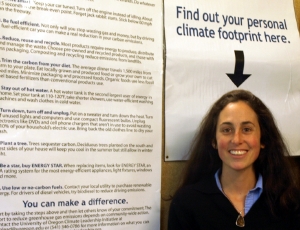May 15 2008
Forty-two Eugene-area residents took some big steps to improve their environmental friendly living styles after completing a newly developed Climate Master program at the University of Oregon. Their efforts resulted in reduced greenhouse emissions by two tons per person, according to a review of the program's first year.
 Sarah Mazze of the University of Oregon is the director of the newly developed Climate Master program to help individuals reduce their carbon footprint.
Sarah Mazze of the University of Oregon is the director of the newly developed Climate Master program to help individuals reduce their carbon footprint.
That remarkable reduction, said Sarah Mazze, the program's director, represents a 15-percent reduction from the carbon footprint of a typical Eugene resident. Through their actions, the participants reduced their personal greenhouse gas emissions by an average of 4,317 pounds, according to the report. The 42 people, including one couple, lived in 41 households.
"I think that what these people achieved were small changes over a period of time that resulted from changes in the way they had been thinking," Mazze said. "We heard that people began making decisions differently, as if they were operating with a climate filter. They started understanding where their greenhouse gas emissions were coming from. If you don't know where they come from, you can't make choices to reduce them."
As staff members of the UO's Climate Leadership Initiative reviewed the program's pilot year, they also found a surprise result: Participants reported that they had gained "a sense of community" as they began to address what individuals can do to fight back against climate change fueled by human activity, Mazze said.
"We found that people were reporting a greater sense of well-being and that they really were changing some of their daily behaviors and practices," Mazze said. "They had to slow their lives down a little bit to remember to grab their reusable mugs for their cups of coffee in the morning. They enjoyed the new pace of their lives and said that some of the changes, like biking or walking more, took them outside and put them in greater contact with their neighbors."
Some of the things participants began doing to reduce their emissions were making more energy-efficient purchases, using alternative transportation, buying fewer disposable goods such as plastic water bottles, eating less meat, growing some of their own food, flying less, turning down the water and space heaters and joining appropriate organizations and making their views on global warming known. Most already were recycling and composting, buying organic food and engaging in a variety of other climate-positive activities.
The results, by category, are detailed in the Climate Leadership Initiative's report, which is available on the CLI's Web site (see links below). Also available is a handbook and curriculum that local governments, utilities, extension services, non-profits and others can use to start their own Climate Master programs.
"I think that it was empowering for these initial participants to be able to get through a long list of things that many of them had wanted to do to save energy in their homes, for example, but had never gotten to do until they were surrounded by a group of people who were also doing these things," Mazze said. "It gave them an extra boost to do these kinds of things."
The Climate Master Program is based loosely on the national Master Gardener and Master Recyclers programs. Most current research, Mazze said, is geared toward policy and technological changes rather than what individuals can do to help in the fight to curb emissions. Participants in Climate Masters receive 30 hours of instruction, and then are required to give 30 hours back through public outreach and education to neighbors or groups.
The data in the report came from 42 of the people who had completed either the Climate Master training class or received a household consultation from a trained class participant during 2007. Actual reductions in emissions were based on their efforts during the last half of the year extrapolated over the full year, Mazze said. In all, she said, the program reached 1,250 people, through educational outreach efforts, as a result of 50 individuals who went through the initial offering of the Climate Master program.
After going through the program, Paul Moore of Eugene, told an interviewer preparing the first-year's report: "I have a broader perspective, across the board, from ideas about how buildings are built, to how food is distributed, to how it is grown, to all the vast variety of ways you can reduce energy consumption in households."
The next step, Mazze said, is to make the program available nationally. Mazze and colleagues are working with four other Oregon communities that are preparing to take part in the effort.
"We have developed a successful outreach program for households and individuals to support them in making climate-friendly choices, and this model can be replicated around the nation," Mazze said. "We need to be making much bigger cuts in our personal emissions to avoid the catastrophes that could occur if the future goes as the scientific models are predicting. This approach is a way to help set us on the right track to a solution."
Sponsors of the pilot program were the Eugene Water and Electric Board (EWEB), Commuter Solutions, Jerry's Home Improvements and a private donor.